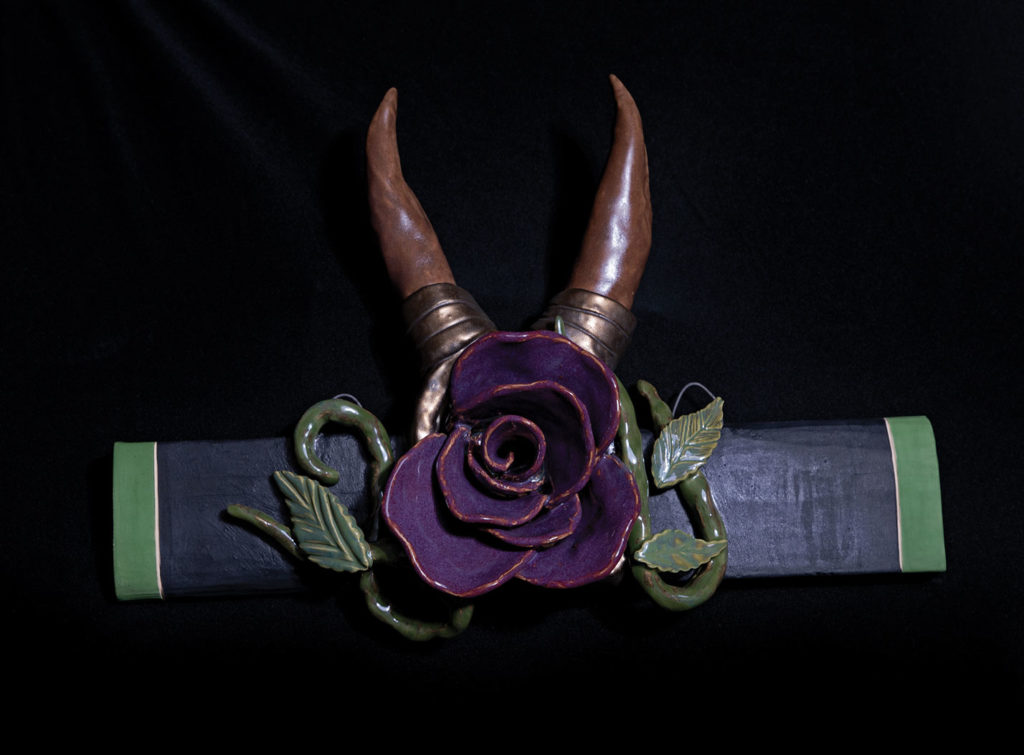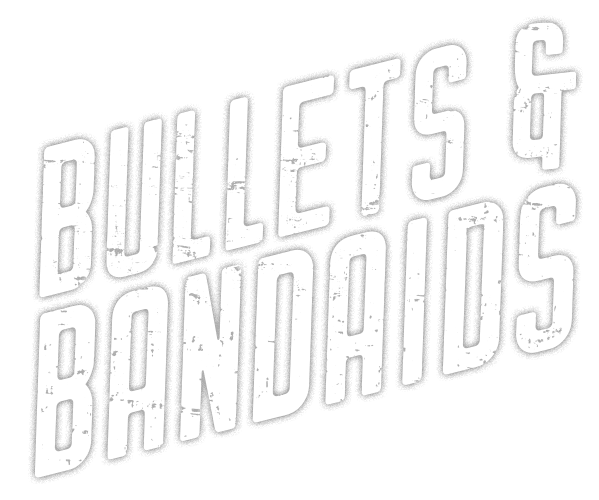
Sara Scott
14″ x 10″ x 2.5″ • Stoneware Ceramics
Artist Statement
I was born and raised in Columbia, South Carolina and I’ve studied sculptural art since high school. I was initially drawn to clay because I could pick up a clump of what is essentially ‘earth’ and turn it into anything. I love the excitement of opening the kiln and hoping your piece survived the thousand or so degrees of heat without exploding. This fragile dance between beauty and disaster, wet and dry, light and dark, calls me back to clay every time. When I joined the US Navy and was stationed on a ship out in the middle of the sea, I remember watching the flying fish leaping through the waves as the ship was moving. The military can be an inflexible and rigid place. Art saved me from what the military drained from me. Reading the story of another veteran and bringing my healing perspective of art, has been a novel and illuminating experience.
I created a piece to show how life can evolve and grow out of the unpleasant. The story was of a young man destined for the military who became a doorgunner during Vietnam. What the man in the story couldn’t see were the demons that were waiting for him on the other side of service. The title of my piece is “Voices that Rose”, referring to the demons that can sneak into the light from dark moments, screaming at you to do something. The rose in my piece has fought through the iron and metal to create a bloom of life, colorful and rich, where there should be none. This man found a new mission, to help veterans, which is still strong today and he is still fighting the demons of his past. I have fought those demons too. What has kept me safe is the beauty of new creation and new life. South Carolina has so much beauty, you can see it in the trees with the life that thrives around it. One of the demons lurking in the darkness of my mind is the death of the natural world. Fortunately for us, life is abundant and growing beneath it.
Instagram: @saragraceceramics
by Tom Baker
A song came out many years ago that was sung by several very good groups. It was titled “He Ain’t Heavy, He’s My Brother.” Think about those words as I tell you a story.
I’m an Army brat raised by an ol’ brown boot Sergeant Major who was much like Sam Elliott’s character Sergeant Major Plumply in the movie We Were Soldiers. I don’t ever remember being called a “Weatherman,” but there was often much confusion amongst me and my three brothers as to who was “Dammit” and who was “Jesus Christ” when Dad barked at us. We walked a fairly tight line growing up, to put it mildly. We didn’t know that PTS had been around a long time and called many things in the past, battle fatigue and shell shock, but regardless of what you call it, it hurts the soldier as well as those around him or her. Discipline, discipline, discipline–us boys were destined for the military.
I was smaller than my two older brothers when I was growing up, and I got bullied quite a bit in the fourth and fifth grades until I finally stood up and put a stop to it. It wasn’t easy, but that effort probably spurred me to choosing my MOS when I joined the Army right out of high school. You probably guessed it: 11 Bravo. I picked airborne infantry. A young and Gung Ho eighteen-year-old boy/man. I got to Vietnam the 21st day of February 1968. I wanted to go to Ranger School, but the Army sent me to Parachute Rigger school, so I was sent to Phu Bai about seven miles south of Hue with the 504th rigger company with the 101st Airborne. As a rigger I saw the rear echelon shit, but as a grunt I humped with a QRF with the 2nd battalion. After about four and a half months of that mixed up shuffle, I got drunk one night and told the 1st Sergeant (who was a really good guy) that I was tired of that shit. He laughed for a second and then looked me in the eye. “Baker, you can get out of here in a body bag, or you can be stupid enough to be a door gunner.” I told him “I always wanted to fly.” My orders came down in less than three weeks, and I headed to Camp Evans and the 1/9 1st Cav. stationed just northwest of Hue. I had seen a story about that unit in a magazine called Soldiers of Fortune. They were called the ‘cong killingest outfit in Nam.’ It was a true ass-kicking outfit, and I would fly doorgunner with H troop for seven and a half months. I flew into far too many hot LZ’s and got shot down twice. I was able to crawl away from both. Not everybody did.
Often times the first demons you have to fight when you come home is survivor guilt. Why and how did I make it back when several of my buddies and my best friend didn’t make it? Why did the rounds sail through my chopper or miss me and hit a grunt waiting to unload? Why, why, why. That, my friends, can eat you alive.
The struggles many of us go through involve coming to terms with PTS, and what the hell was that, anyway? We’d never heard of it when we came back from Nam. But I can tell you from personal experience that PTS can lay in the back of your mind for years before one night it jumps into the forefront, and you are back in the fight. It can start with one bourbon too many, a war movie you shouldn’t be watching alone, a sharp crack or noise or smell. Whatever it is, you stare it in the face. I was very lucky one night ten years ago. I didn’t pull the trigger on the 45 I had stuck in my mouth while tears rolled down my cheeks and dripped off the pistol grip. Not many things can save a man or woman in that tragic and tough moment. I seriously believe what saved me were the voices of my friends and buddies who didn’t make it back. Voices that rose above the shouting from the demons telling me that I hadn’t done enough. The voices from my buddies told me that I had hung my ass out in the hell of combat many times, and that the god of war had spared me, and that I had work to do. “Help your fellow veterans,” they shouted in my ears. So, after a minute, the tears stopped, the demons slowly crawled back into their hole, and the 45 slid back into its holster. I HAD A MISSION! HELP OTHER VETERANS!
Taking on that mission was not easy because I was working two full time jobs. Logging with another old timber man in the mountains of western North Carolina and working nights in the recreational gym at Western Carolina University. Where to start? What to do? I joined the local Vietnam Veterans of America group, the American Legion, and even the VFW that had told many of us Nam vets years earlier that they didn’t want us “baby killing-dope smoking assholes” who had “lost that damn war.” I joined because I needed and wanted to be around other veterans. Through these groups I learned about a program within the VA called “writing for healing” without really knowing why I felt that writing would help me. I started a journey with a pen in my hand instead of a rifle.
A couple of years went by and one Veterans Day I was at a luncheon event with another Vietnam veteran Darwin Thomas who also worked at WCU. It was 2007 and the fighting in Iraq was still raging. Darwin and I both noticed how few people were attending the event and how few veterans were there. He and I started hatching the idea of putting together an outfit that could reach out to the young men and women coming back from yet another war.
Now, the reception these soldiers were getting was much better than the shit thrown at us soldiers coming back from Vietnam, but we felt these young vets would need our help. We were right. Darwin and I formed an independent veterans group and simply called it the Jackson County Veterans Organization. It took us about three months to get organized and make contact with not only students veterans at WCU and Southwestern Community College, but local veterans of all wars. We had one WWII veteran, three Korean veterans, four of us Nam vets, and about a dozen Iraq and Afghanistan veterans. We had three female Army vets and one female Marine. Not bad for a start or at least we thought so. We held meetings (we called them gatherings) every two weeks on Sunday afternoon at 5:00. We were given a special room at a local restaurant called the Sneaky Squirrel that was owned by a veteran.
I want to emphasize two important things we did at every meeting. At the beginning of each gathering, I looked him or her in the eye and asked each one there how they were doing. No bullshit, how are you doing? We got to know each other well, we knew their family, and we knew their demons. Most veterans won’t and can’t talk to their loved ones about their problems, but many veterans will talk to another vet. The other important thing we stressed was doing things together. We might go to the shooting range; we might go hiking or simply drink a beer or two together. We became brothers and sisters of arms.
We also started two annual events at WCU. One is a “hump” fashioned after the Marine Corps “silkie hike” in which we hike from WCU campus in Cullowhee to Sylva emphasizing the number 22, the number of veterans that kill themselves EVERY day. Over our fourteen years of existence, we have lost two veterans to suicide, and we have one Gold Star widow in our group. The other event we put on at WCU is called “Unseen Scars.” This is a panel of veterans both men and women who talk to an audience of students and local residents about their service be it combat or not. The members of the panel vary from year to year, and they have included veterans from Vietnam who had earned three Purple Heats and a female Army veteran who was blown up by an IED. The Gold Star widow talks about her and her young son’s task of dealing with suicide. Some of the University students relate to the veterans words, but so many of these young people have NO Idea. I often start my talk by asking the audience their age. Most are 19 and 20. I tell them I was one month into my 19 years when I went to Nam.
There is another issue that our vet group and many other organizations are trying to deal with and that is homeless veterans. This shit is not easy nor simple. We have the occasional “walker” who passes through with his dog and needs help. We have veterans with family who are in need of housing. We have veterans who have a dishonorable discharge, so most agencies steer away from them. We need more veterans helping veterans. I believe that veterans need more help from people who truly want to thank them for their service and welcome them home.
I could go on and on, but just know that my mission is ongoing and the demons never go away.
